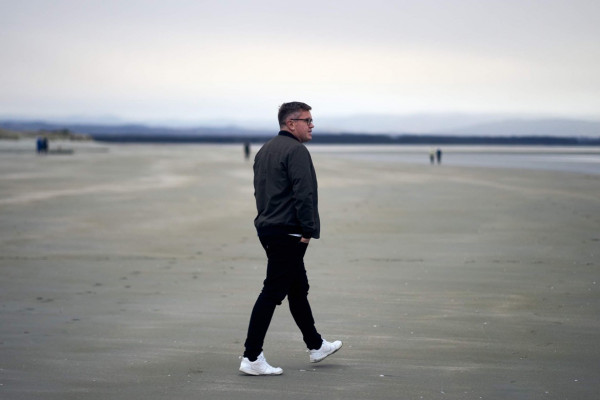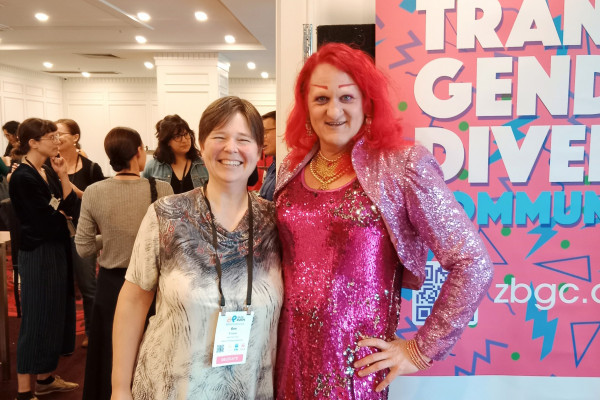Content warning: This story discusses anxiety and depression.
In February 2022, Aotearoa banned conversion practices. Last year, the Human Rights Commission asked survivors to take part in a study to understand how it affected them and what kind of support they need.
The research was released in May and it found conversion practices in religious settings need to be classified as spiritual abuse.
Bex Fraser (they/them) grew up in a religious family who went to church at least three times a week, where they were taught to believe God will send gay people to hell.
“It was the idea that gay people were sinful, and if you had any urges like that, then you needed to be prayed with, or prayed over, and I saw people have demons cast out of them.”
When Bex realised there was something different about them, they kept it a deep secret because it didn’t feel safe to talk to anyone about it.
“You’re brought up being told that God knows all your thoughts. So, there’s literally nowhere to [go], even to talk to yourself about what you’re feeling or thinking,” the 48-year-old says.
“It wasn’t until I had my own space [in my mid-20s] that I was able to [come out], and I lost a whole number of people in my family, who just stopped talking to me after that.”
These experiences, Bex says, led to them living with anxiety and depression most of their life.
Conversion practices in faith-based settings to be called ‘spiritual abuse’
A study commissioned by the Human Rights Commission interviewed 23 survivors of conversion practices, stating such practices in religious settings need to be viewed as spiritual abuse.
The research found defining it as abuse will allow appropriate support for survivors to be developed, including a “pipeline to safety” that ensures current victims of conversion practices can safely escape.
This includes establishing a dedicated agency led by survivors and working to prevent harm from within faith-based organisations.
The research shows medical support and psychotherapy, a long-term and more in-depth talk therapy, should be provided. It also advises for those professionals to be trained in spiritual abuse specifically.

Craig Watson, a survivor of conversion practices in faith-based care, made a submission to the Royal Commission Inquiry of abuse in care. (Photo: Supplied)
The study comes as the Royal Commission of Inquiry shed light on the harrowing reality of abuse in state and faith-based care on July 24, including a report of experiences of takatāpui and rainbow communities.
One of the survivors who sent a submission to the inquiry is the founder of charity Diverse Church, Craig Watson.
He says he underwent 12 weeks of intensive counselling in his mid-twenties, after his pastor received a report from a parent that Craig and her son tried to date.
“It was at my free will [to go] but my will wasn’t balanced because I’ve been taught this was the only way - it was either hell, or do the conversion practices," the 42-year-old says.
Craig says the psychologist tried to “de-programme his brain” in order to be straight.
“It led me to have anxiety around ‘What am I going to do?’ because I can’t seem to change and I seem to be this defected person.”
Craig has stayed in his faith, saying Christianity is about loving yourself, the land, and people.
“Communities that gather around those principles are really important for the development of young people.
“Church was a space for me to find some positive values that have turned me into the person I’m proud of today,” he says.
He says this is why he started Diverse Church, a place to connect LGBTTQIA+ Christians to safe and inclusive churches across Aotearoa.
Lack of Government services and specialist counsellors to help survivors
Despite the Conversion Practices Prohibition Legislation Bill passing in 2022, members of the rainbow community say there are gaps in the bill, including no ACC coverage for mental harm experienced as a result of conversion practices.
Craig says it’s not fair survivors can’t get ACC funding for support such as therapy sessions.
He says he also found it difficult to find a counsellor who can understand and unpack the complexities of conversion practices.
Even after spending tens of thousands of dollars for therapy, he says he still doesn’t know the full extent of how conversion practices have impacted him.
Something he says he’s currently working through in therapy is why he still sees sexual interactions in healthy relationships with other men as almost disgusting and wrong.
“It’s really hard to see positivity in [my] relationships.”
When asked why ACC doesn’t cover survivors of conversation therapy practices, deputy chief executive for strategy, engagement and planning Andy Milne said in a statement that most claims involve physical injuries caused by accidents and mental injuries in some cases, which are set out in the Accident Compensation Act 2001.
“Under our legislation, ACC can cover mental injuries if they are caused by physical injuries, caused by a single traumatic event at work, or caused by certain criminal acts related to sexual abuse and assault (as specified in Schedule 3 of the Act),” he says.
Andy also stated that the Ministry of Business, Innovation and Employment (MBIE) is responsible for advising the ACC Minister about the scheme, including legislation and regulations governing it.
In a statement, MBIE’s accident compensation policy manager Bridget Duley said while they sympathise with survivors, any expansion of ACC requires careful analysis of the benefits, impacts and costs.
“There has not been any work done on amending the legislation.”

Bex Fraser (left) with Starlady (right), a social justice advocate from Australia who works with the Zoe Belle Gender Collective. (Photo: Supplied)
For Bex, they’ve used therapy over the last two decades to work through the harm caused by conversion environments, and have found most counsellors aren’t equipped to deal with survivors of spiritual abuse.
Bex has used their past to help the rainbow community experiencing family, partner and sexual violence.
Now a team lead at Hohou te Rongo Kahukura - Outing Violence, a charity focused on preventing and addressing violence experienced by takatāpui and rainbow people, they say there aren’t any Government-funded services available for the community.
“There needs to be services specifically designed for our people and our needs, such as asking us about our pronouns, and always being able to talk about sexuality.
“It’s an absolute basic need in our society and we haven’t got that,” they say.
Mental Health Minister Matt Doocey says the Government’s Access and Choice programme provides free community mental health and addiction services across the country.
“Part of this programme has included a $4.4 million package for primary mental health and addiction services for rainbow young people and to deliver rainbow competency training to mental health and addiction workforces.
“Work is also underway to consider the recommendations of the final report on the abuse and neglect of children, young people and adults in the care of State and faith-based institutions.”
Where to get help:
- 1737: The nationwide, 24/7 mental health support line. Call or text 1737 to speak to a trained counsellor.
- Suicide Crisis Line: Free call 0508 TAUTOKO or 0508 828 865. Nationwide 24/7 support line operated by experienced counsellors with advanced suicide prevention training.
- Youthline: Free call 0800 376 633, free text 234. Nationwide service focused on supporting young people.
- OUTLine NZ: Freephone 0800 OUTLINE (0800 688 5463). National service that helps LGBTIQ+ New Zealanders access support, information and a sense of community.
More stories:
What it’s like to be a Māori drag queen
“We’re strong together and we will face anything together.”
Being queer in a small town doesn't have to be shit
“If I hadn't moved to small town New Zealand, my life would be a lot smaller.”
What my chosen whānau means to me
"For some people, chosen family is all they have."